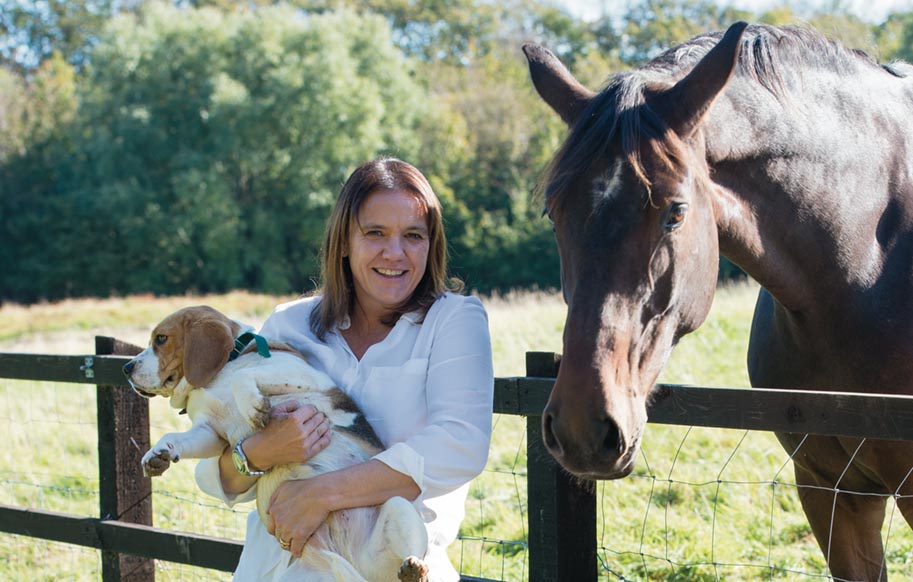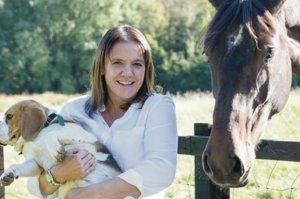 We meet one of the Island’s top businesswomen – and discover that the road to success hasn’t been an easy one
We meet one of the Island’s top businesswomen – and discover that the road to success hasn’t been an easy one
It’s easy to look at Caroline Ross and imagine she was born with ‘silver spoon’ syndrome. At the age of 44 she is one of the three directors of Medina Foodservice, the Island’s well-known catering wholesaler with a multi-million pound turnover. Four years ago, the company doubled its capacity at a stroke, by moving into the 30,000 sq ft warehouse space formerly occupied by Red Funnel, in Newport.
As well as supplying many of the Island’s top hotels and restaurants, pubs, care homes, schools and prisons, Medina also has a base on the mainland, supplying and sourcing products along the south coast.
As the wife of Steve Ross – whose grandfather Harry planted the seeds of the business back in 1947 with a humble butcher’s shop – it might appear that Caroline simply ‘married into’ the family firm, but nothing could be further from the truth.
Indeed, she admits to feeling a certain irritation when people make that assumption.
Much closer to the truth is that Caroline was the one who brought an outsider’s eye into the family-run business back in the late 1990s, and was responsible for many of the changes that set the whole enterprise on a new footing.
Had she not met Steve and got involved in that business, you get the feeling that with her sheer pluck and determination she would simply have created a similar success somewhere else.
Early days
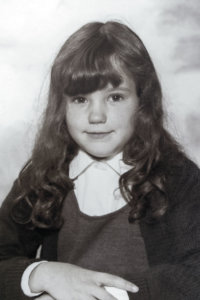 Born in Cambridgeshire, Caroline moved to the Island at the age of just three, when her prison officer father was posted here – so, as she says, that makes her “as good as an Islander”.
Born in Cambridgeshire, Caroline moved to the Island at the age of just three, when her prison officer father was posted here – so, as she says, that makes her “as good as an Islander”.
The family, which included mum, dad and two brothers, lived in prison officer quarters at Wootton, and Caroline started at the village primary school, later moving on to Lake Middle School and Sandown High.
During childhood, she experienced her parents’ divorce, mum’s re-marriage, and with that, the addition to her family of two step-sisters.
All that seems to have left her relatively unscathed – although she says her parents didn’t put a lot of emphasis on schooling, and she herself positively ‘hated’ going to school.
“I used to skive off from Sandown High School, or just sit at the back of the class, messing around” she recalls.
“Now I regret that, and do wish I had achieved more academically. I know that I could have done well, if only I’d just knuckled down to it at the time”.
At 14 she toyed with the idea of hairdressing, did some YTS work experience in a salon whilst still at school, but then decided it wasn’t for her.
What really gave her a buzz was horse riding. When Caroline’s mother Jean moved in with stepfather Roger French at the age of 10, they were all treated to equal value presents for each of the five children to help them overcome what they had all been through with the divorce. Caroline’s choice was a pony.
So when at 16 she left school and was under pressure to decide what to do, Caroline announced… she would be a showjumper!
Life on the Mainland
Her first step to this dream was to set off for the mainland, where she secured a job in the yard of Hampshire-based international horse trainer Fiona Dunning.
“It was probably the hardest job I ever did – working a seven-day week, travelling round to shows and with 19 horses to muck out and look after” she says.
When the head girl left, Caroline was promoted into the position, although she was still on the YTS scheme and earning a minimal wage.
She stuck at the hard routine because she saw it as a route to her showjumping dream.
“Fiona helped me to find a horse and I began to work my way up and win some events”.
After three years at Fiona’s yard, Caroline then moved to Shaftesbury Showjumping Centre, owned by Terry O’Brien (uncle of comedian Dawn French), for whom she rode for two years.
Naturally, Horse and Hound magazine was Caroline’s regular bedtime reading – and she was excited one day to see a job advertised with the late Lionel Dunning, world-class showjumper based in Lincoln.
A total of 90 people applied for the job – but it was Caroline who got it. Mainly because of the impression she made even before her interview began.
“While I was waiting, I started tidying up the yard, which had been left in a bit of a mess” she says. And so impressed was Lionel that he made her his head girl, which involved training foreign students, and travelling to shows.
She was also taking part in showjumping, with great success, and enjoying every minute of it.
All of which might sound very glamorous – but the fact was, she was still earning only £40-odd a week.
“Horses were my world but really I didn’t have the money to go any further with competing. I was in my early 20s, driving round in a crappy little Fiat Uno and having to starve myself to buy stuff for the horse. I was always hungry – but if it came to a choice of buying something for the horse, or something for me, I’d always choose the horse”.
Gradually, Caroline was deciding that if she couldn’t put 100 per cent into her show jumping, she didn’t want to do it after all – and that ‘100 per cent rule’ has stayed with her.
She left Lionel Dunning’s stables at 24, moved to a Mansfield mining village with a boyfriend, and signed on at the jobcentre, which yielded her a job as a machinist in a clothing factory.
“That was one of the hardest jobs you can imagine,” she says. “The place had a tin roof, so it either rained inside or was so hot in the summer that you couldn’t breathe”.
But as an ex-stable girl, Caroline was used to hard graft, and stuck it out as a way of paying the rent.
It was only after her relationship with the boyfriend broke down that she decided it was time to head “back home” to the Island.
Home turf
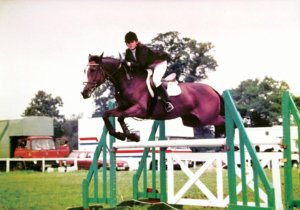 Back here, Caroline had to move in with her grandmother because she had no home or income – but she was determined to change all that.
Back here, Caroline had to move in with her grandmother because she had no home or income – but she was determined to change all that.
Before long, she had a job at Tesco’s coffee shop, which eventually led to a full time position.
“I worked every hour I could, every day, to afford a better car,” she says. “I worked in different departments, including the ice cream kiosk”.
She also offered herself for longer shifts and different departments, and instinctively took charge if circumstances demanded it.
“We had a new section manager Tony Crumplin, who noticed this and put me on the management training scheme”.
She later became section manager in charge of the coffee shop and staff restaurant.
“It was hard work, but it really taught me how to get on with different types of situations and how to deal with people and customers”.
After two years and a lot of overtime at Tesco, she was doing so well that she not only had a ‘better car’ but also had a mortgage on a little £30,000 semi-detached home of her own.
It was then that she met Steve Ross, a director of the then-named company Medina Meats, which was looking for a sales rep at the company.
Caroline says she could see the potential of the company, but knew that taking a job there would scupper her hard-won career path at Tesco’s – not to mention taking an initial pay-cut.
For a while, she put in a few hours at Medina whilst still working for Tesco – but ultimately realised she had to make a choice. And the choice was to take a gamble on the ‘unknown horse’ and accepted the sales rep role with Steve’s family firm.
Move to Medina
“I could see the potential of the business but it definitely needed better procedures to be put into place. Nobody had a specific role and there was no leadership – so there was plenty to do!” she says.
Not surprisingly, Caroline ran into severe opposition from some of the long-standing staff in the early days. Some even left as new systems and routines were put into place.
“I was in the office sometimes from 5am until 8pm, picking up phone calls literally one after the other. I was educating drivers on procedures, keeping the customers happy – there was a lot to do”.
Her Tesco training had sharpened Caroline’s sense of customer service: “If we were short on stock, I insisted on letting customers know. You have to have those high standards, treat customers how you would want to be treated”.
While all this was going on, Caroline and Steve were planning their wedding – which somehow got squeezed in between stints at the office!
“The night before we got married I was in the office until 9pm and on the day of the wedding, Steve sorted the answer machine messages and got the drivers organised.
Not surprisingly, Caroline recalls being “pretty exhausted” during the wedding. She and Steve did manage to escape to Barbados for a seven-day honeymoon but then it was straight back to work, where again they would battle to run the operation with “Three old Sherpa vans that were on their last legs, two new vans, 12 staff and two girls in the office”.
The amazing thing is that, with such modest resources – plus a whole lot of grit and determination – Caroline and Steve began turning Medina around. Sales began to increase exponentially – some weeks by 50{a9dddf1bd2af35332cd5613cac8e63e148b38f23ebed35c9943c32a7f65a9815}, 75{a9dddf1bd2af35332cd5613cac8e63e148b38f23ebed35c9943c32a7f65a9815}, and one week, by a whopping 125{a9dddf1bd2af35332cd5613cac8e63e148b38f23ebed35c9943c32a7f65a9815}.
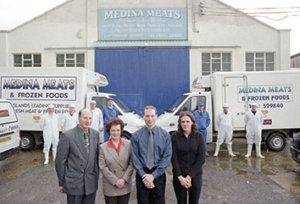 The business grew so much in fact that it started offering frozen food – which ultimately was to become the company’s big area of growth.
The business grew so much in fact that it started offering frozen food – which ultimately was to become the company’s big area of growth.
“Each year, we’d build another freezer, until finally we had 100s of pallets worth.”
In tandem with this, the company gradually took on more reps, more office staff, and updated the computer systems.
In 2002 Steve’s parents retired, and he and Caroline purchased the remaining shares to establish them as owners of the business.
She admits they had to endure negative comments from people, but says that only served to spur them on. “If someone says ‘you can’t do that’ it just makes me more determined to do it.
“Despite what people thought, we didn’t just inherit the business – we had to re-mortgage and paid a good amount for the shareholding but we will always be grateful that Steve’s parents gave us that opportunity”.
Of course, it meant even more hard work: whilst Steve and Caroline’s friends would be enjoying Cowes week or frolicking on the beach, they were in the office seven days a week.
2002 also saw the birth of their son Brandon – and not only did Caroline work more or less right up to the birth, but she also took her newborn son into the office so that she could keep on top of things, literally a few days after he was born.
“Everything that could have happened at that time to make it more difficult, did” she says. “People left and all I had were agency girls and a new born baby in the office, trying to answer the phone and dealing with drivers until I got people I could rely on.
“When I look back I regret the time I could have spent with Brandon, but you do always have to sacrifice something, that’s just the way life is”.
Out of that tough experience, Caroline and Steve managed to build a good working team – which these days stands at 72 members of staff, 24 vans including five on the mainland.
Brandon is now doing well at school in Lymington and Caroline says she’s pleased he’s able to enjoy the educational opportunities that she never had. “If it turns out that he wants to be a gardener, that’s fine with me” she says, “but at least he will have had more opportunities open to him”.
As for the business, Caroline and Steve now have to consider whether to expand further – which could mean a larger base on the mainland.
“There’s more potential on the mainland, but our main concern will always be keeping our Island customers happy. We are totally committed to the Island and are here to stay.
“I’m sure the opportunity to expand will come along but it has to be right”.
Despite the undoubted financial success of the business, Caroline insists that money has never been her main driver.
“Achievement is what makes me happy” she says, “getting the best out of myself. If it was money that motivated me, I’d never have worked with horses, would I?”



